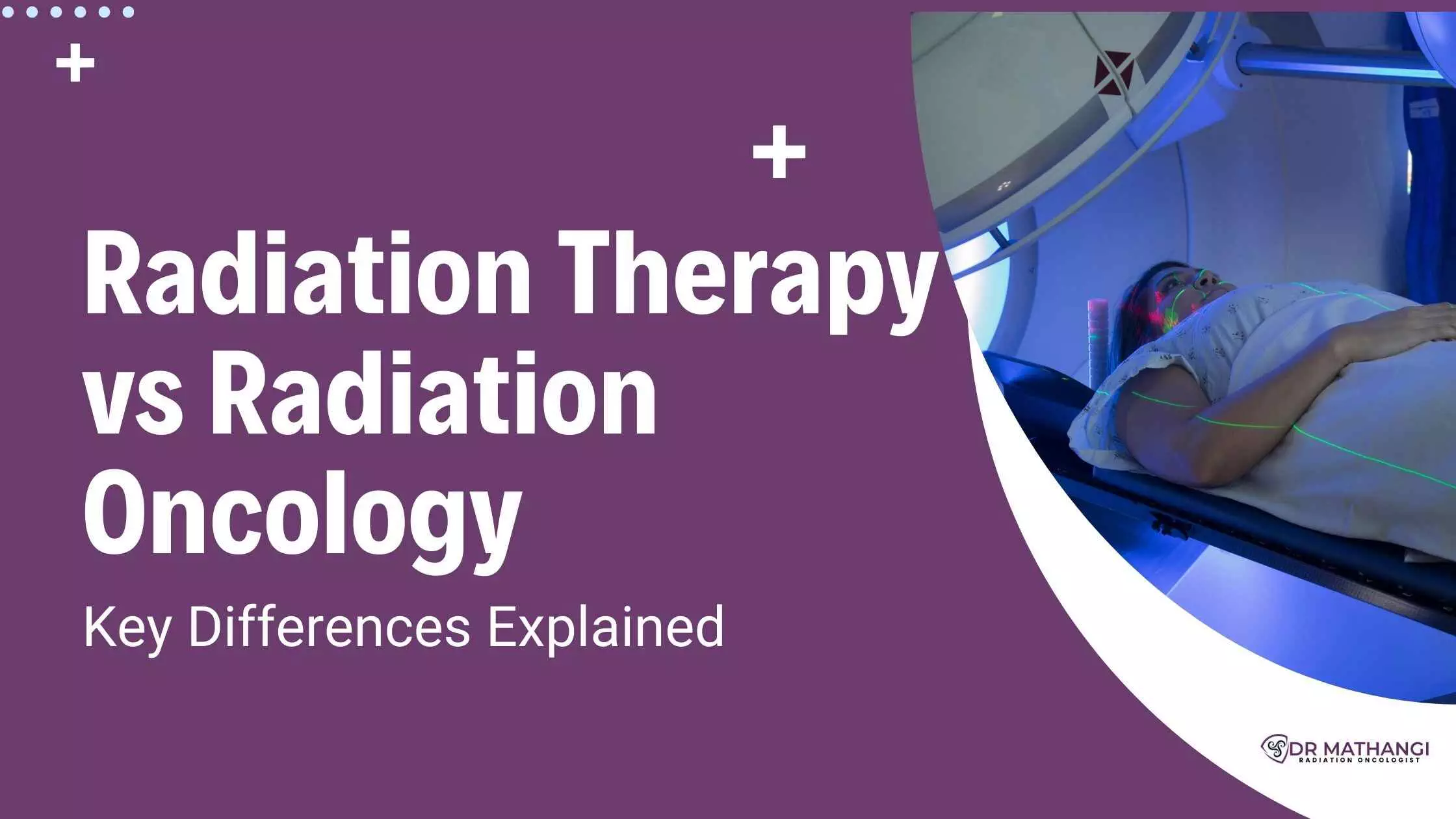
According to the American Cancer Society, nearly 60% of all cancer patients undergo some form of radiation treatment during their battle against the disease. Yet, there is often confusion around the term's radiation therapy and radiation oncology. Are they the same? Do they serve different purposes? And most importantly, who should you trust when it comes to administering this life-saving care?
With over 15 years of experience and more than 12,000 patients successfully treated, Dr. Mathangi J is one of India’s foremost authorities in radiation therapy and radiation oncology. As the Senior Consultant and In-charge of Radiation Oncology at Gleneagles Cancer Institute, she specializes in advanced radiation techniques such as SBRT, SRS, IGRT, and Interstitial Brachytherapy. Her education and training across Germany, Denmark, and India, along with her pivotal role in installing Asia Pacific’s first TrueBeam STx Machine, make her a trusted name in modern cancer care.
Choosing the right doctor for oncology care can mean the difference between standard treatment and truly transformative healing. Let’s unravel the key differences between radiation therapy and radiation oncology and explore how Dr. Mathangi’s approach redefines cancer management.
The terms are often used interchangeably, but they’re not quite the same. Radiation therapy refers to the actual therapy methods or procedures used to deliver high-energy radiation to destroy or damage cancer cells. Radiation oncology is the broader medical specialty that includes diagnosis, planning, treatment, and monitoring. It’s managed by a specialized doctor called a radiation oncologist—like Dr. Mathangi—who oversees the entire patient journey.
Absolutely. Radiology vs Oncology often causes confusion, but the distinction is clear. Radiologists primarily focus on diagnosing diseases using imaging tools like CT, MRI, or X-rays. On the other hand, oncology care involves the treatment of cancer, which includes chemotherapy, surgery, and radiation. Radiation oncologists are not radiologists—they are cancer treatment specialists.
Radiation treatment involves delivering focused energy beams to shrink or destroy tumors. Techniques used by expert radiation oncologists like Dr. Mathangi ensure the cancer cells are precisely targeted while sparing healthy tissues. Some of the advanced radiation techniques she employs include:
A radiation oncologist like Dr. Mathangi plays a crucial role in a patient’s cancer journey. She:
It’s not just about machines and doses—it’s about holistic, patient-centered care.
Radiation can be used to treat a wide array of cancers, either alone or in combination with surgery and chemotherapy. Under Dr. Mathangi’s expert care, patients with the following conditions have seen exceptional outcomes:
Each case is treated with tailored therapy methods using cutting-edge technology.
Modern therapy methods are not just about eradicating cancer—they’re about improving quality of life. With image-guided and motion-managed systems like TrueBeam STx (installed by Dr. Mathangi herself), treatments are faster, more precise, and less invasive.
What sets Dr. Mathangi apart is her commitment to comprehensive oncology care. From counseling and diagnostics to advanced radiation and post-treatment rehabilitation, her team supports patients every step of the way.
Not knowing the difference between radiation therapy and radiation oncology might leave you confused about the right treatment choice. But now you know—choosing an expert like Dr. Mathangi could be the key to better outcomes, fewer side effects, and peace of mind.
If you or a loved one is navigating the world of radiation treatment, you deserve the best. Book an Appointment with Dr. Mathangi Today
Radiation therapy and radiation oncology are closely related but not identical. Radiation therapy is the actual procedure of delivering high-energy radiation to treat cancer, using specific therapy methods. In contrast, radiation oncology is a medical specialty encompassing the overall planning, execution, and follow-up of these treatments. A radiation oncologist like Dr. Mathangi leads this comprehensive approach.
A radiation oncologist is a medical doctor specialized in managing cancer through radiation. Dr. Mathangi, with over 15 years of experience and 12,000+ patients treated, is an authority in the field. She develops personalized treatment plans, determines optimal radiation techniques, monitors patient progress, and ensures minimal side effects during radiation treatment.
Radiology vs oncology is a common point of confusion. Radiology focuses on diagnosing disease using imaging like X-rays, MRIs, and CT scans. Oncology, including radiation oncology, is concerned with the treatment of cancer. Dr. Mathangi’s expertise lies in oncology, specifically in using targeted radiation for curative and palliative purposes.
Dr. Mathangi offers some of the most advanced radiation treatment options in India:
Cancer radiation is highly effective for various malignancies. Dr. Mathangi specializes in:
Selection of radiation techniques depends on the type, size, and location of the tumor, as well as the patient’s health condition. Dr. Mathangi utilizes sophisticated imaging and motion tracking to ensure precision. For instance, lung cancer patients may benefit from gated therapy, while brain tumors often require stereotactic techniques.
Oncology care under Dr. Mathangi goes beyond just treatment. It includes:
Few specialists offer the level of experience and technological expertise that Dr. Mathangi does. She was instrumental in installing the first TrueBeam STx in Asia-Pacific and leads the Fellowship in Advanced Radiotherapy. Her commitment to precision, innovation, and personalized care puts her at the forefront of radiation therapy and radiation oncology.
Booking is simple. Visit this contact form and submit your details. Her team will schedule your consultation and provide further instructions. Whether you're newly diagnosed or exploring advanced therapy methods, it's the first step toward expert oncology care.
When managed by a skilled radiation oncologist like Dr. Mathangi, side effects are minimized with advanced techniques. Her methods are designed to target only the tumor, using real-time imaging and precision technology. Patients are continuously monitored and supported throughout their radiation treatment journey.